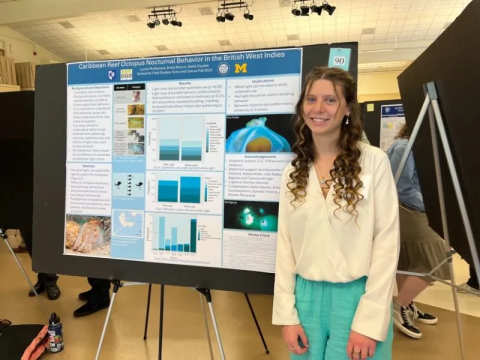
Lynne McNamara, from Amherst, New Hampshire, is a senior majoring in Environmental Science: Ecosystems with a minor in Marine Biology at the University of New Hampshire.
Lynne presented her research on the Oyster River watershed at UNH’s Undergraduate Research Conference (URC), showcasing her work on monitoring changes in water quality.
Tell us about your research in as non-technical language as possible.
Lynne McNamara: I analyzed a data set on the Oyster River watershed collected by the NH Volunteer River Assessment Program, looking for patterns and changes in the watershed.
What challenge does your research seek to address?
Lynne: My research addresses changes in water quality due to climate change, road salt runoff, agricultural runoff and other human-caused sources of harm.
Your work elevates research supported by the NH Agricultural Experiment Station. How will your work benefit people, communities and/or the natural environment in New Hampshire?
Lynne: Since the Oyster River is a drinking water source for the town of Durham and receives wastewater discharge, it’s important to monitor and understand changing water quality dynamics. The river also provides critical habitat for invertebrates that serve as indicators of ecosystem health and are important to the environment.
What are you learning as a result of your experience?
Lynne: I am learning new ways to present data and share what I’ve learned with a wide audience, and to think more critically about the underlying causes of data trends. Because I have been working mostly independently with some help from my advisor, I have also learned a lot about time management and collaboration.
Who are you working with? (Faculty, grad students, other undergrads)
Lynne: I am working with my advisor, Wil Wolheim, and with the Oyster River Watershed Association and Durham NH Volunteer River Assessment Program volunteers.
What should prospective students know about UNH?
Lynne: There are so many opportunities to get involved in all kinds of projects if you just go out and look for them! Professors are generally really friendly and want you to get involved. Not every lab always has space, but if you keep looking, you’ll find the right opportunity for you.
What do you love most about UNH?
Lynne: I love how helpful all the professors are. Everyone wants you to succeed and reach your full potential. There are so many doors that will open for you if you just knock!